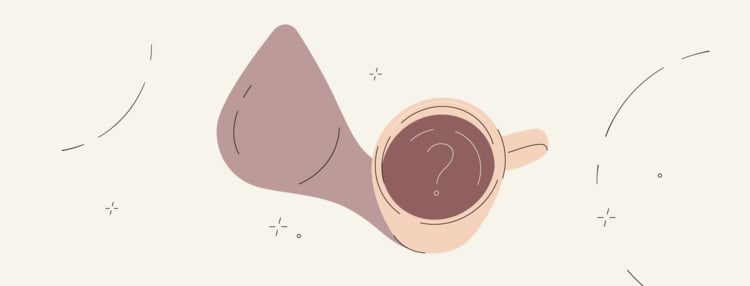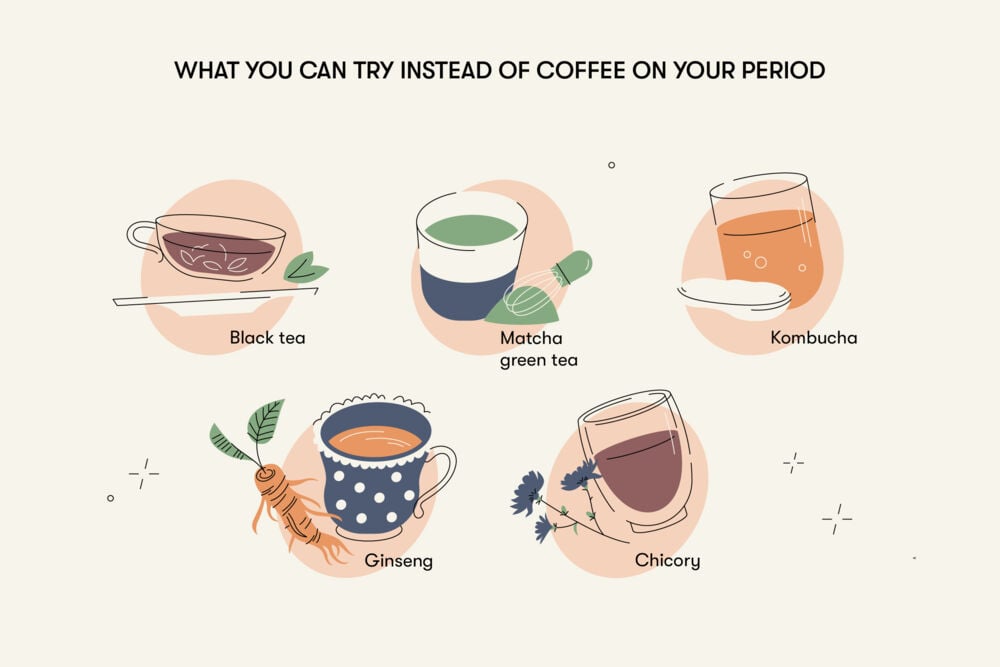Caffeine is the world’s favorite drug: the Netherlands is the biggest coffee consumer in the world, followed by other Nordic countries. According to the U.S. Food and Drug Administration (FDA), Americans drink an average of two to four cups of coffee daily. But caffeine isn’t just in coffee; it’s also in some teas, sodas, chocolate, and medications. Many researchers have studied the potential health benefits and drawbacks of caffeine, but what’s the impact on the menstrual cycle? Is it bad to drink coffee on your period? Read Flo’s article for the answers!
-
Tracking cycle
-
Getting pregnant
-
Pregnancy
-
Help Center
-
Flo for Partners
-
Anonymous Mode
-
Flo app reviews
-
Flo Premium New
-
Secret Chats New
-
Symptom Checker New
-
Your cycle
-
Health 360°
-
Getting pregnant
-
Pregnancy
-
Being a mom
-
LGBTQ+
-
Quizzes
-
Ovulation calculator
-
hCG calculator
-
Pregnancy test calculator
-
Menstrual cycle calculator
-
Period calculator
-
Implantation calculator
-
Pregnancy weeks to months calculator
-
Pregnancy due date calculator
-
IVF and FET due date calculator
-
Due date calculator by ultrasound
-
Medical Affairs
-
Science & Research
-
Pass It On Project New
-
Privacy Portal
-
Press Center
-
Flo Accuracy
-
Careers
-
Contact Us
Does Caffeine Help Cramps? Things To Know About Coffee On Period And During PMS


Every piece of content at Flo Health adheres to the highest editorial standards for language, style, and medical accuracy. To learn what we do to deliver the best health and lifestyle insights to you, check out our content review principles.
Can you drink coffee before and during your period?
Official recommendations from the American College of Obstetricians and Gynecologists (ACOG) and Association of Reproductive Health Professionals say to avoid caffeine altogether to relieve PMS symptoms and breast tenderness. But people have different sensitivities and reactions to caffeine, and some are more tolerant than others. These recommendations are based on prior studies that could have also been influenced by other factors known to influence PMS, like smoking and obesity.
In fact, in a 2016 study published in the American Journal of Clinical Nutrition, scientists found that after taking these factors into account, high caffeine intake was not linked to breast tenderness, irritability, and fatigue.
But it’s not just PMS that could be affected by caffeine; drinking coffee during your period is linked to longer, heavier periods and other irregularities, according to a 2014 study in the Journal of Taibah University Medical Sciences. Researchers believe this is due to the effect of caffeine on reproductive hormones.
Does caffeine help cramps or make them worse?
If you’re wondering, “Does coffee help period cramps?” the short answer is: no.
Caffeine blocks a hormone that can make blood vessels (which are present in the uterus) smaller, slowing the flow of blood. Coffee can also cause inflammation and bloating, adding to tummy pain. So, drinking coffee can make cramps worse.
However, research on the topic of coffee and cramps is rather mixed. A few studies in 2014 and 2016 found that drinking coffee was linked to a higher intensity of period pain, and that a high caffeine intake may even double the risk of painful cramps. But other studies from 2009, 2011, and 2016 found no link between caffeine and cramps.
Can caffeine make you dizzy and nauseous before or during a period?
If you’ve experienced “coffee nausea,” it could be a sign that you’ve had too much caffeine. Sweating, restlessness, nausea, diarrhea, and anxiety are all symptoms of caffeine overdose. Excess caffeine can make you dizzy, too. Dizziness can mean that your body isn’t pumping enough blood into your brain, since caffeine stimulates heart rate and boosts blood pressure.
Can caffeine help with PMS fatigue?
Feeling tired during ovulation or as your period approaches is common, so it’s natural to want to reach for a cup of coffee to combat PMS fatigue. Caffeine is a stimulant; it makes us more awake, but for some, it can also increase other unpleasant symptoms of PMS like anxiety and irritability. It can also mess with sleep patterns, leaving us feeling more tired or grouchy.
Take a quiz
Find out what you can do with our Health Assistant
How much coffee is OK before and during periods?
Our genetics, age, weight, liver health, and tolerance all play a role in how we metabolize caffeine. In general, the FDA states that 400 mg of caffeine per day is safe for most adults (around four cups of coffee). When it comes to drinking coffee during your period or PMS, experts recommend limiting caffeine intake, but the exact amount you can have will depend on how your body processes caffeine.
Substitutes for coffee on your period

Some alternatives to coffee that you may consider switching to before and during your period are:
- Black tea: There’s less caffeine in tea than in the average cup of coffee.
- Matcha green tea: It has about one-third the amount of caffeine of a cup of coffee.
- Kombucha: A fizzy drink made from yeast fermented with tea, it has some caffeine, but still less than a cup of coffee.
- Chicory: Chicory root can be used to make a drink that tastes like coffee, but it’s milder and caffeine-free. However, it might trigger an allergic reaction in some people, and there is also not enough evidence if it’s safe during pregnancy.
- Ginseng: This herbal tea contains no caffeine, but it can help boost your energy and improve mental performance.
To help with PMS, experts from the Cleveland Clinic recommend exercising 150 minutes per week and eating a healthy diet by limiting salt, eating leafy greens, nuts, and fruits, drinking plenty of water, and getting enough vitamin D. The ACOG also recommends taking 1,200 mg of calcium per day to relieve physical and mental symptoms of PMS. Chocolate has also been found to relieve PMS symptoms, which is great news for those of us who get cravings!
Takeaway
Experts say that avoiding or limiting coffee on your period can help relieve PMS symptoms and cramps. But the key thing to remember is that all bodies are unique, and we handle caffeine differently. Pay attention to the signals from your body after you consume caffeine before or during your period, and keep track of symptoms in your Flo app.


Hey, I'm Anique
I started using Flo app to track my period and ovulation because we wanted to have a baby.


The Flo app helped me learn about my body and spot ovulation signs during our conception journey.


I vividly
remember the day
that we switched
Flo into
Pregnancy Mode — it was
such a special
moment.
Real stories, real results
Learn how the Flo app became an amazing cheerleader for us on our conception journey.




